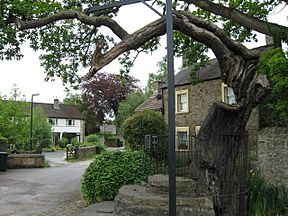Caton Oak facts for kids
The Caton Oak was a very old oak tree in Caton, Lancashire. People believed it was as old as the time of the druids, who were ancient Celtic priests. Because of this, it was also known as the Druid's Oak.
This special tree stood on top of some old steps called the "Fish Stones." Long ago, in medieval times, monks used these steps to sell salmon they caught from the river. The Caton Oak became a famous local landmark. Sadly, the tree started to get weaker in the 1900s. People tried to help it by adding a metal support. In 2007, an acorn from the tree was planted to grow a new one. The original Caton Oak finally fell down on June 20, 2016.
A Tree Through Time
The Caton Oak was thought to be a very important spot in the village for a long, long time. This goes back to the time of the druids. For them, oak trees were sacred and often used for religious ceremonies. That's why this tree was also called the Druid's Oak. There's even proof of Roman activity nearby, like an old millstone found in the area.
The Fish Stones
The Caton Oak's roots were in the River Lune. Its trunk grew right above some old sandstone steps. These steps are known as the "Fish Stones." In the Middle Ages, monks from Cockersand Abbey used these steps. They would display and sell salmon that they had caught in the river.
In a photo from 1905, the tree looked very healthy. By the 1940s, the tree's spot was used by a traveling blacksmith. This smith from nearby Hornby would set up his forge there. He would shoe horses for the farmers in Caton.
A Village Symbol
The Caton Oak became a well-known symbol for the village. You could even see it in the logos of the village school and its sports club! A sign near the tree said it was listed as a historic site. This was done by the Department of National Heritage. A local council member said in 1996 that the tree was "the most important landmark in Caton." They wanted to save it as long as possible. The village of Caton is located in the beautiful Forest of Bowland Area of Outstanding Natural Beauty.
The End of an Era
The Caton Oak started to decline in the late 1900s. By 1996, people worried it had become dangerous. Experts suggested cutting it down. But the villagers and the local council worked together to save it. They put up metal supports for its branches. These improvements were made in 1998. They got help from various groups and public donations.
By 2007, the tree's trunk was hollow because of decay. It measured about 4 meters (13 feet) around. On April 27, 2007, something special happened. The High Sheriff of Lancashire, Ruthe Winterbottom, planted an acorn from the tree inside its hollow trunk. The idea was for a new tree to grow from the old one. The original Caton Oak finally fell on June 20, 2016.


